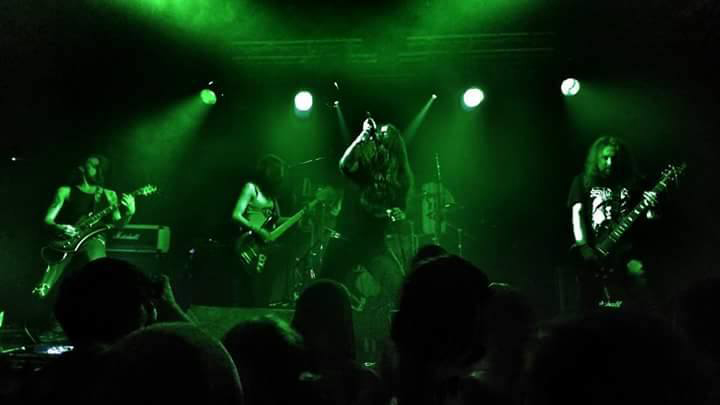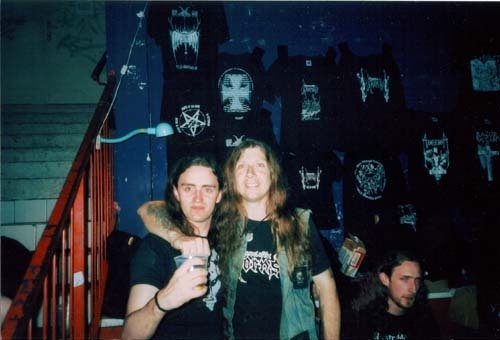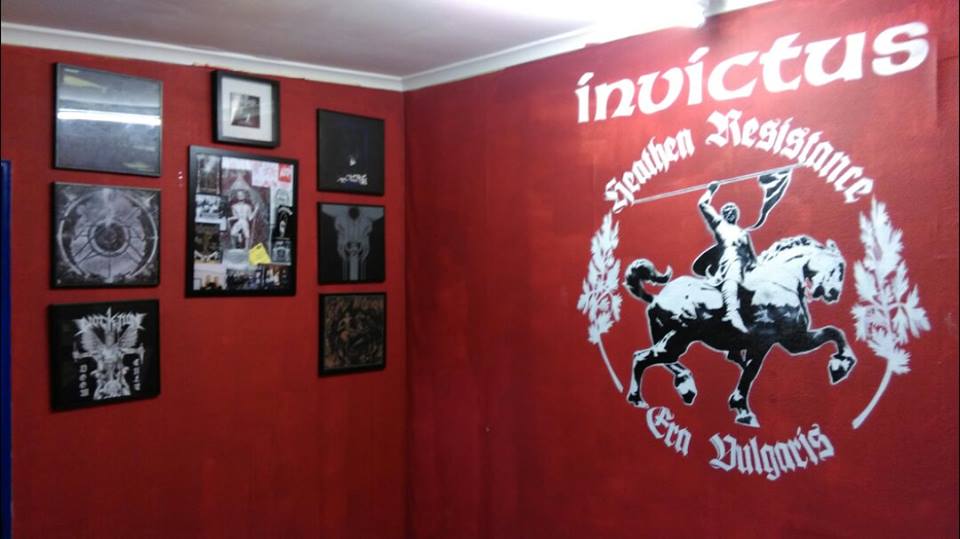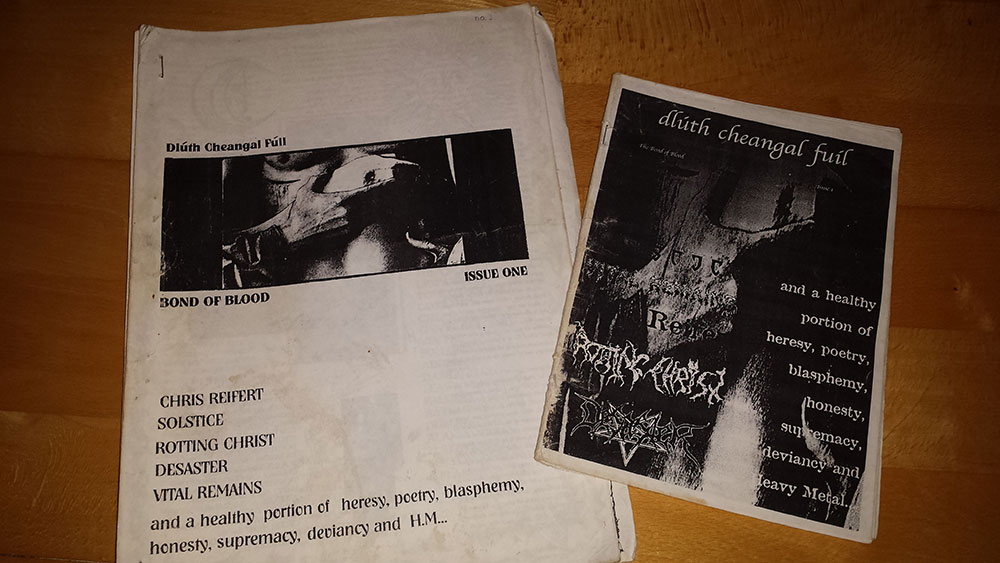Invictus Productions
2016-10-26
by Niklas Göransson
An in-depth conversation with Invictus Productions manager and Vircolac frontman Darragh O’Laoghaire, in which we explore the pragmatic leanings of the Irish mind-set and deliberate if the history of black metal rests on false foundations.
Exclusive stream – “The Cursed Travails of the Demeter” EP.
– We had agreed within the band to do a 12-inch following the demo, says vocalist Darragh O’Laoghaire, and so once that was out of the way and new material was coming together, our focus was on the EP. Throughout 2015 we wrote two new songs, “The Cursed Travails of the Demeter” and “Charonic Journey (Stygian Revelation)”.
The conceptual artwork framing the release pays homage to a titan of Irish literary history – Bram Stoker.
– His novel and the cinema it spawned have been big parts of my life, going back to 1992 when I was a teenager and the Bram Stoker’s Dracula film by Francis Ford Coppola came out.
A little known fact is that the Dracula character was in fact profoundly influenced by Celtic mythology.
– Stoker was able to grasp the darker aspects of Irish folklore and meld them into his novel by using an entirely different representation via vampires and indeed, Transylvania. I’d say this has in no small part affected the presentation of our EP.
The point was to have a very Irish depiction without it ever being aesthetically evident.
– I think to this end, we have achieved that aim. As well as that; we are a death metal band and the imagery is of exactly that – death. That’s what we try to evoke in our music and accompanying artwork.
Focus on domestic tradition and legend is rather typical for Irish metal, a scene that’s historically been largely unaffected by the various theological trends that occasionally ravage Europe.
– Principally, I think it comes down to our nature and how it manifests culturally and uniformly. It’s impossible to convey to someone who doesn’t quite understand Irish life but it would’ve been inconceivable for a band like EMPEROR to have emerged from here.
A gang of sullen, black-clad Satanists cavorting about the village looking grim and evil would have been unlikely to fare well in rural Ireland.
– The town rough-nuts would have seen this behaviour as something to engage with physically. Keeping one’s head below the parapet when it came to engaging in culturally anomalous behaviour was almost like an unwritten rule.
While every Irish town and village in the late eighties had headbangers with patched vests, mullets and high-tops, this was broadly seen as part of a wider expression of youth identity. There was no spiritual rebellion.
– When things got more serious with the rise of black metal across Europe, attempts to replicate what was going on in Norway would have resulted in swift punishment from the local populace before the cops got anywhere near you.
This, he says, is one of the best aspects about his windswept island home.
– We don’t get this contrived, pseudo-religious metal emanating from here. Fundamentally, the Irish psyche just doesn’t lend itself to the hyperbole of subcultural religious orthodoxies. It just doesn’t translate at all, in any which way.
While the Devil as the adversarial accuser might resonate as an archetype, submissive devotion to him or his acolytes isn’t something that really resonates with the Irish folk soul.
– I look at the megalithic sites we have here – thousands of years old and long outdating any ideas that the Common Era has spawned, and it’s impossible not to see the vastness of time and universe. Understanding our place in this ancient world through the prism of a recent phenomenon seems a little dull, in my view. There is so much more.
For a country in which abortion is still illegal and where contraception was outlawed until 1980, the iron grip of the church has loosened significantly in modern times.
– What people don’t realise though, is that the very magic that flourished and made Ireland such a unique and fascinating place was all but extinguished through the Catholic school system over the course of the 20th century.
Especially in rural areas, children were both physically and mentally beaten into absolute subjugated reverence for the cloth.
– This would have been stultifying beyond comprehension, I bore witness to it in many kids as I was growing up. Coming from deeply conservative backgrounds, even if they had an imagination it would’ve found short shrift from their parents. Though I had some run-ins with mine as a teenager, they were certainly more liberal than many others.
The relative secularisation of Ireland coincided with the end of The Troubles, a low-level guerrilla war that lasted from the late 1960s until the Belfast ‘Good Friday’ agreement in 1998.
– This would indeed indicate that the general population’s concern for scripture grows in times of turmoil and upheaval. I’m reminded of the wonderful GK Chesterton quote:
When men choose not to believe in God, they do not thereafter believe in nothing, they then become capable of believing in anything.
– We saw this here again just in the last decade, with the Irish recession. A steep economic downturn, one that results in people’s lives turning meagre, will usually be followed by faith and all its connotations feeding back into the psyche.
The loss of material possessions also revokes access to indulgences, and we’re left with the perennial hole of existence in our lives.
– As a consequence of that, people are drawn to faiths and cults, hoping to gain some understanding of life and the universe. Whilst cosmetically this might be seen as a good thing, the very nature of the human being is to control.
![12314715_844811325632433_6938439164161793079_o[1]](https://www.bardomethodology.com/wp-content/uploads/2016/10/12314715_844811325632433_6938439164161793079_o1.jpg)
Do you see any of this trickling down into metal?
– A lot of what I consider pseudo spiritually aware aspects of contemporary underground metal is an extension of the phenomenon. I see these European bands from countries with fucking amazing histories, cultures and plenty to write about. Yet they are all, whether they realise it or not, going for the universality of some cobbled together theories, concepts and philosophies.
This is symptomatic of a desire to fit in, he says, as opposed to being different.
– The quest for understanding and search for answers has always been present but this cod, Eastern, hocus-pocus, incense-and-idiocy that is prevalent nowadays is indicative of a sense of uniformity.
Speaking of which, the last time we heard from Darragh on this site was in connection with the Ajna Offensive meditation challenge. He announced his intention to keep it up, so naturally the readership demands an update on how this fared.
– Dismally, he sighs, further attempts have proven almost impossible due to distractions and scheduling conflicts. Finding the time to properly dedicate myself is a luxury I can’t afford at the moment, but it is something I’ll try to engage with when the time is right.
As he gets older, he continues, matters of consciousness certainly engage him more than they ever did.
– All these new questions presenting themselves in tandem with both recent scientific and archaeological discoveries.
So none of this aging contemporary-man-angst or feelings of there being no magic left in the world?
– No, it doesn’t have to be that way. I have recently found myself completely reinvigorated by the opening of new pathways – concepts and ideas for finding that little bit of the wonder in our existence. There is still mysticism if you know where to look; it’s just that we lost sight of it.
Five years ago, Darragh went on a road-trip around the south-west coast of Ireland. Along the way, he revisited sites his parents took him to as a child.
– Gazing out over the Atlantic Ocean filled me with such awe and wonder; it literally feels like you are at the end of the earth.
What lies at the end of that aquatic vastness is the Unites States of America, a shore that up to 1.5 million Irish are expected to have sailed for – mostly during the Great Famine between 1845 and 1852. As well as that, the area is littered with pre-historic tombs, Iron Age forts, medieval castles and so on.
– I revisited again this year and found it even more compelling. A rekindled sense of wanderlust has since sent me around the country into all manner of ruins and ancient structures, which has in turn contributed to me seeking new avenues of exploration.
Having grown up in the countryside surrounded by things of this nature, Darragh says that living in the city tends to isolate the senses to varying degrees when it comes to connecting with the land. He grew up in Mitchelstown – a township of 3 300 in southern Ireland, to this day best known as a centre for cheese production.
– It was hardly what you might have called a cosmopolitan hub of thriving cultural interchange, given its location. It’s a small, agricultural town in County Cork that at the time was on the route between Dublin and Cork cities.
‘At the time’, not any longer?
– No, it’s been bypassed and the main road is now a ditch. As for myself, I have the usual story – an older metal guy got me into this whole thing. Then there was the electrical store in town that sold some vinyl and cassettes.
Among the selection one could find the current Earache Records roster, Noise Records releases, and bands like SLAYER, METALLICA and MEGADETH.
– Once I started buying magazines such as Metal Forces and Metal Hammer, the shop manager was able to get me some of the heavier gear. There were guys my age in town that to varying degrees were into the same stuff I was, but it quickly became apparent that my interest lay in the expansive world of the tape trading underground.
In 1991, at 15 years of age, Darragh sent an ad to Thrash ‘n Burn magazine and began tape trading with likeminded folk all over Ireland. One of them was Jamie Grimes, who now plays guitar in VIRCOLAC.
– Another one was Paul Kearns from SOLSTICE, who now works with me at Invictus. The tape trading route was what broke the entire thing open for me. It connected me with tonnes of people, and was a veritable news channel with the millions of flyers and fanzine recommendations.

In 1997, at 21 years of age, Darragh moved the 200 kilometres from his hometown to the nation’s capital; Dublin.
– Cork, which was the city local to me, went absolutely dead for metal in the mid-nineties. Pill-head culture took over in 1994 and everyone went from headbanging to dancing like spastics.
This transition wasn’t exclusively a bad thing.
– Ireland was pretty rough-and-tumble in the eighties and nineties, so intra-group violence was a regular, normal thing here. When the pill-craze really kicked in, most of the socially inept metalheads gravitated more towards becoming a tracksuit-wearing gibbering mess.
Dublin still had bands on the go, there were gigs happening and there were a few rock pubs as well as a more solid fan base. It made sense to ‘follow the noise’, as Darragh puts it. Despite getting regular access to metal, the relocation wasn’t exclusively enjoyable.
– Where I initially lived was a fuckin’ shithole, replete with junkies, ex-cons and other assorted social detritus. I had things robbed and was broken into, so moving to Dublin was a massive smack around the ears. Coming from rural Ireland, I was very naive about a lot of the real world.
If I know my metal history right, Irish low-cost airline Ryanair opened the gates of Europe to the country’s metalheads.
– It changed everything, and in the best fucking way possible. My first time using ’em was in 1997 to go to Dynamo Open Air in Holland – it cost me something like 20 pounds.
To put this into perspective, he mentions having travelled to London in February 1996 to see AT THE GATES and DISSECTION on a flight that cost 140 pounds.
– Being able to go to shows, meet people we were in contact with, and have bands fly here broke down so many barriers. Living on an island on the periphery of Europe, in the shadow of Britain and of course America – you get cabin fever and need to get out.
Darragh says that one of the greatest things that the underground metal scene has provided him with is a platform on which to engage with others; discussions on topics that mainstream society and even other alternative subcultures would frown upon.
– The endless hours of debating, shouting, fighting, bickering – but always learning, this is simply the best aspect of having been into this thing my entire life. It’s a constantly moving and reshaping experience.
As far as metal being a lifestyle, he adds, this is quintessentially what that comes down to – the experience of ideas colliding
– I see the advent of social media as the death of this, sadly. Is there anything more fucking pathetic than a forty-plus year old man constantly decrying what is and what isn’t metal on Facebook, in a one-man campaign to assert his own quality control over the entire thing? Not to mention all the hysteria and ignorance sold as information and a deliberate attempt to neuter and censor people; a climate of the absurd.
How do you foresee this developing?
– More censorship, more witch-hunting, more splitting and atomising. Today’s ideologically driven narrative and people’s inability to actually question this means they’re now finding aspects of bands that they’ve always loved to be unconscionable.
These individuals make a lot of noise, he says, about causes they know are ‘in’ on social media. They pick the low-hanging fruit in the argument, anything to indulge their righteous indignation.
– These people will burn out eventually, their self-loathing and hatred will consume them and they will break down. It’s inevitable. Carrying that much rage and bitterness is inherently unhealthy.

In a recent conversation, Darragh mentioned having read my No Fashion Records article and taken an interest in former MORBID member Dr. Schitz’s comments on Dead and Euronymous from MAYHEM.
– I’ve constantly found myself being asked questions by civilians about the whole Norwegian aspect of black metal, which led me to make some inquiries of my own.
After people he knew lost loved ones to suicide, he started questioning the whole Dead story.
– I would always find myself thinking that really, Euronymous was a bit of a cunt and perhaps deserved to be turned into a pin cushion for his actions and behaviour. Glorifying a young man’s despair and subsequent suicide as ‘black metal’ is as remedial as thinking that BURZUM is verboten but WU TANG CLAN is slick.
Has this affected your view of black metal history?
– The juvenility behind what went on in the Norwegian scene was finally dealt with in that interview and it struck a chord for common sense with me.
This, he claims, goes to show that the entire phenomenon of Norwegian black metal basically stems from Euronymous‘ jealousy towards Swedish death metal bands that were getting popular. They were touring and putting out records while MAYHEM were stuck in a house outside Oslo daydreaming.
– All pretty fucking pathetic really. Dead’s suicide has been mythologised over the years and photos of his corpse are everywhere. Despite hanging the LP on my wall when I was younger, these days I find any exploitation of a young guy who killed himself out of desperation to be repugnant.
Darragh adds that despite this; the music, feel and atmosphere inherent in the classic albums of the time will never leave him.
– Even if the characters are by now well-worn merry-go-round props. But in philosophically breaking down ideologies and concepts, starting with something as simple as black metal mythology is a good place.

We might as well talk a bit about Invictus Productions too. Darragh’s record label and distribution is home to the likes of NEGATIVE PLANE, GOSPEL OF THE HORNS, MALTHUSIAN, VOMITOR and QRIXKUOR.
– By the late nineties, all I had done was tape trade, organise a show and produce two fanzines – Ancient Wisdom and Dlúth Cheangal Fuil (which means ‘bonded by blood’ in Irish). I wanted to expand my interest and involvement in the underground, but I wasn’t quite sure what that entailed.
The scene in Dublin between 1997 and 2000 was the epitome of underground.
– A bunch of bands playing in tiny venues to equally pitiful crowds, everyone trying to find an identity but most of them having nothing to say either creatively or aesthetically.
Having been writing to people, tape trading and ordering zines from abroad; his interest always extended beyond Ireland’s shores and so he began thinking about starting a label.
– How difficult could that be, right? The genesis was in early 1998 when in a twist of fate, I met two Australians. Steve Hughes from SLAUGHTER LORD and Simon Turner – who was then on board to join DESTRÖYER 666, arrived in Dublin separately pursuing adventure and we all met.
It was these chance meetings that ultimately gave birth to Invictus. The label’s first release was a compilation album of now-comedian Steve Hughes’ old band SLAUGHTER LORD; “Thrash ‘Til Death 86-87”. At the time of this article, that was 18 years and 96 releases ago, and the label and distro operation has expanded significantly.
– I think the growth comes down to persistence and doggedness. I’ve spent a lot of time working directly with people and bands, as opposed to being an anonymous email address hiding behind terms such as ‘hail’, ‘Frater’, ‘In Nomine Sathanas’ and so forth.
Instead of simply living off the music he’s actively gone to gigs and festivals abroad, and still does. Being a recognisable face and someone available for conversation in person, he believes, has helped the label to no end. As for where it’s going …
– I don’t have a ‘road map’ in the sense that the achievements I strive for are all entirely artistic and personal – not commercial. This might appear either pretentious or even unambitious, neither of which are true.
Darragh adds that when he started all this almost two decades ago, he never imagined Invictus to be at the point it is now.
– The one thing that’s always been consistent is my interest in the music I’m releasing at any given point. Though there are some things that in hindsight might not have been the best choices, I believe they reflect where my head and heart were at the time.

Did any of your releases provoke a strong response?
– Yes, the most obvious one being TRIBULATION’s second album “The Formulas of Death” (2013). Reactions were both positive and negative. It amused me to no end, seeing people who had once done their best to court my attention to sign their bargain basement war metal bands suddenly turn face and deride the label.
On the other hand, he then had scores of ‘social media vultures’ befriend him because of it.
– A hilarious flip-flopping of fickle folks all in search of their own belonging. I learned through that entire experience that my own music choices for the label are perceived and interpreted vastly differently by others.
The name of the label was not a random choice, but something that was selected with a formulated philosophy behind it.
– I learned early that life is a clenched fist, hidden but always ready to deal an unsuspecting blow. You have to learn to get through life by picking yourself up again after getting knocked on your arse, and push on. The word ‘invictus’ was something ORDER FROM CHAOS – one of my favourite bands of all time, used to brilliant effect.
Then, in 1998, VIRGIN STEELE released an album called “Invictus”; a name with symbolism and connotations that resonated strongly with him at the time.
– It ties in with the Celtic mythological hero Cú Chullain – who in his final battle had himself tied to a rock, still clutching sword and shield to defend his territory. This idea of self-sacrifice, determination, will and resilience was something I always found appealing in a world of fickle loyalties and narcissistic self-gratification.
Though he concedes to perhaps not having lived up to those concepts and philosophies in every single aspect of life, it sets a standard that is highly aspirational.
– I can now see the mistakes I’ve made in life. One learns nothing if one doesn’t fail at things, so it has had an important ideological function for me personally. Both as a name and a concept, Invictus is something I created on my own and if we’re to use a metaphor, it is the temple I have built and worship in alone.

